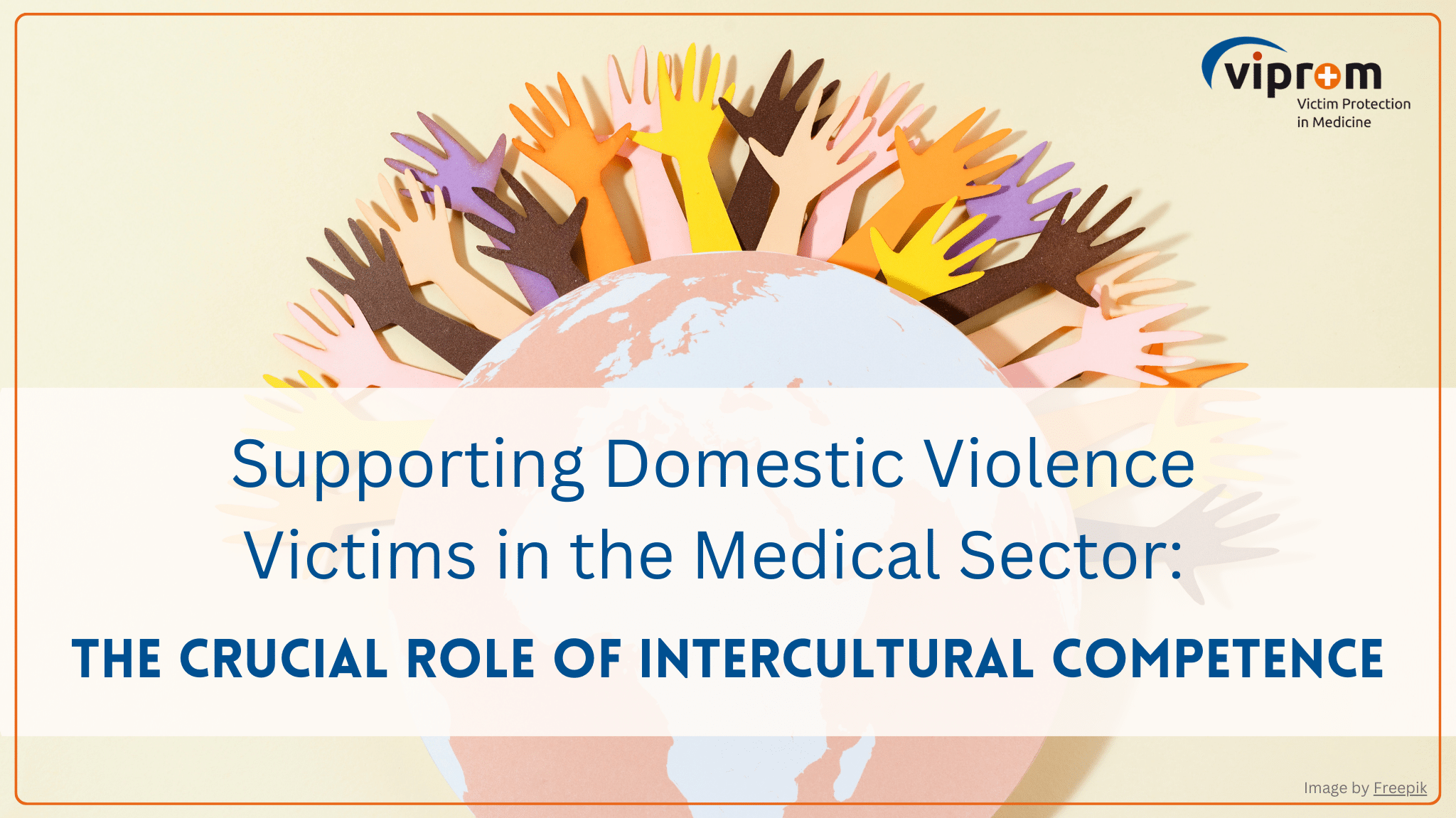
Image by Freepik
Effective communication is culturalised, and hence requires an empathic, trust-infused, culturally competent, informed, and action-oriented approach.
UNDERSTANDING INTERCULTURAL DYNAMICS IN HEALTHCARE
In the field of healthcare, where compassion and understanding are paramount, the importance of intercultural competence cannot be overstated. Particularly when addressing the multifaceted issue of domestic violence, healthcare providers must possess the ability to navigate and understand the diverse cultural factors that shape individuals’ experiences. As we explore the intricate dynamics of human experience, we find that culture is not a static entity, but a dynamic network of knowledge and feelings deeply woven into our neurological wiring, influencing how we perceive and interpret the world (Hong, 2009; Northoff, 2016).
The World Health Organisation (WHO) identifies various forms of domestic violence, encompassing economic, psychological, emotional, physical, and sexual dimensions (WHO, 2021). Each of these forms is intricately connected to cultural contexts, demanding a nuanced and culturally sensitive approach for successful interventions.
Northoff (2016) proposes that our neural activity is a product not only of the natural statistics of stimuli but also of their sociocultural context. This means that our brains encode both the natural and sociocultural statistics of stimuli into neural activity, creating a socio-cultural database that influences our perceptions. Unfortunately, this also means that stereotypes and prejudice can become deeply embedded in our perceptions, leading to biases that may manifest in various aspects of life.
FOSTERING INCLUSIVE HEALTHCARE ENVIRONMENTS
In response to these challenges, intercultural competence emerges as a pivotal expertise. Bennett (2004) defines it as the ability to communicate effectively in cross-cultural situations, requiring more than just an awareness of cultural differences. It demands a genuine understanding and appreciation for diverse perspectives, essential for creating an inclusive healthcare environment.

Image of Freepik
The WHO recognises the transformative potential of intercultural competence in healthcare, emphasising a combined approach on the individual as well as on the systemic level that integrates discussions, trainings, and interventions into the policies, regulations, and strategic plans of healthcare organisations (WHO Europe, 2020). The goal is to foster the development of knowledge, skills, values, and attitudes among healthcare professionals, ensuring an inclusive healthcare environment.
The Intercultural Competence framework, as outlined by Breninger (2021), offers a roadmap for this transformative journey. Rooted in the neuro-biological integration of cultural otherness, the framework operates on three levels of change: ethnocentric, ethnorelative, and intercultural. It envisions a society where the successful integration of cultural otherness into the neurological wiring allows for novel ways of seeing and meaning making, emphasising the dynamic and intersecting processes of cultural, gender and ethical aspects.
EMPATHY IN ACTION: DESIGNING INTERCULTURAL COMPETENCE FOR DOMESTIC VIOLENCE CARE
In the context of domestic violence, providing culturally sensitive care rests with frontline responders, general practitioners, dentists, nurses, and midwives. Designing ‘Intercultural Competence’ items for the VIPROM training to enhance intercultural competence presents three main challenges.
Firstly, effective communication is culturalised, and hence requires an empathic, trust-infused, culturally competent, informed, and action-oriented approach. Secondly, the items must be context-sensitive, acknowledging the multicultural, digital, and volatile, uncertain, complex, and ambiguous (VUCA) realities in which healthcare providers operate. Lastly, it needs to be intersectional, recognising the intersecting realities in people’s lives – encompassing race, ethnicity, class, status, gender, sexuality, religion, faith, etc.
To address these challenges, domestic violence trainings of the VIPROM project (https://training.improdova.eu/en/training-modules-for-the-health-sector/) will include specially designed items which aim at enhancing intercultural competence (ICC) for the domestic violence context. An accompanying online ’ICC Handbook’ will be published to encourage health professionals to further develop their intercultural competence for such specific settings.
In conclusion, the journey towards nurturing intercultural competence in the context of domestic violence in healthcare is both, an ethical imperative and a strategic approach to fostering more caring, just, and equal societies. By integrating these principles, particularly in the sensitive domain of domestic violence, we pave the way for an environment that dismantles , fosters understanding, and ultimately provides responsive and people-centred care. It’s a collective commitment to ensuring that every victim receives the support they need, irrespective of cultural backgrounds, promoting a healthcare system that truly serves all.

National Cancer Institute (@nci) of Unsplash
MORE INFORMATION ON DOMESTIC VIOLENCE
If you are interested to learn more about domestic violence in the health sector, please visit our European training platform on domestic violence.
REFERENCES
Bennett, M. J. (2004). Becoming interculturally competent. Toward multiculturalism: A reader in multicultural education, 2, 62-77.
Breninger, B. (2021). A Perceptual Architecture of Intercultural Competence: Avenues for Tracking Cultural Expertise. Newcastle upon Tyne: Cambridge Scholars Publishing.
Hong, Y. (2009). A Dynamic Constructivist Approach to Culture. In R. S. Wyer, C. Chiu, & Y. Hong (Eds.), Understanding Culture: Theory, Research, and Application. New York: Psychology Press.
Northoff, G. (2016). Cultural Neuroscience and Neurophilosophy: Does the Neural Code Allow for the Brain’s Enculturation? In J. Chiao, S. C. Li, R. Turner, A. P. M. P. A. R. Seligman, & D. D. N. R. Turner (Eds.), The Oxford Handbook of Cultural Neuroscience (pp. 21-39): Oxford University Press, USA.
World Health Organization. Regional Office for Europe. (2020). Migration and health: enhancing intercultural competence and diversity sensitivity. https://iris.who.int/handle/10665/332186
World Health Organization. (2021, March 9). Devastatingly pervasive: 1 in 3 women globally experience violence. Retrieved from https://www.who.int/news/item/09-03-2021-devastatingly-pervasive-1-in-3-women-globally-experience-violence
ABOUT THE AUTHORS

Dr. Birgit Breninger is Associate Professor at the Department of Communication Sciences at the Paris-Lodron University Salzburg. She is acting President of the InterCultural Center (ICC), a research organization at Salzburg College. In 2005 she co-founded the Intercultural College at the University of Salzburg and has lead the executive graduate intercultural programmes for over 10 years. Dr. Breninger is chairwoman of the International Board of ICC Experts and author of the book A Perceptual Architecture of Intercultural Competence (2021). She has been teaching and researching internationally and intrigued various interdisciplinary audiences with her passion for culture & people.

Madina Iskazina is currently pursuing an MS in Digital Communication Leadership and International Development Studies at Paris Lodron Universität Salzburg (PLUS), Austria and Wageningen University and Research, Netherlands as an Erasmus Mundus Joint Masters Degree Scholarship waiver. Her research aims to investigate networked feminism in authoritarian settings through a case study on Kazakhstan. She focuses on the use of social media as the main tool to amplify the voices of women affected by gender-based violence. Before starting her Master’s degree, Madina gained over five years of experience in communications and PR. She has been involved in development projects with the European Union, the World Bank, and the United Nations. At VIPROM, she is responsible for the communication strategy on behalf of PLUS and contributes to the development of the intercultural competence module.
 This project has received co-funding from the European Union’s CERV-2022-DAPHNE programme under grant agreement No. 101095828.
This project has received co-funding from the European Union’s CERV-2022-DAPHNE programme under grant agreement No. 101095828.
Newsletter
Please subscribe here for the VIPROM newsletter:
